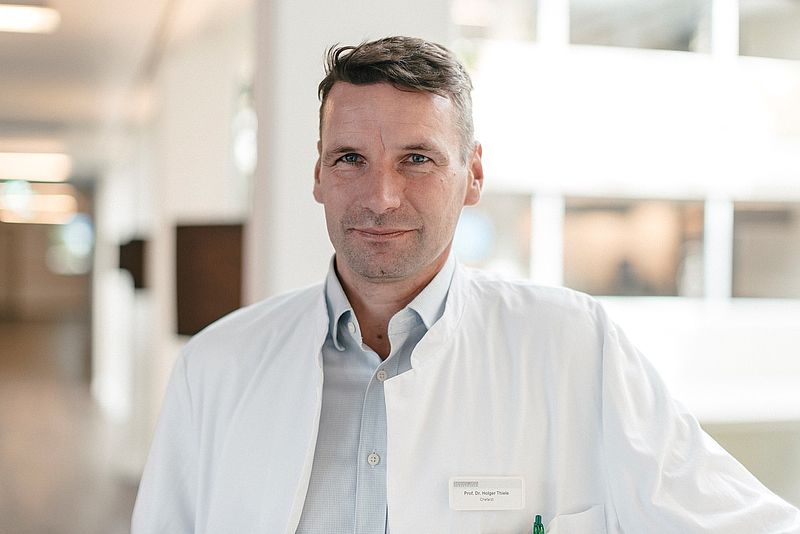When the aortic valve is narrowed, the heart can no longer pump sufficient blood to the body. This puts the heart under severe pressure, causing it to remodel and function poorly . Healthy heart tissue is replaced by functionless connective tissue, and the heart becomes scarred (cardiac fibrosis). In the case of advanced valve stenosis, patients receive a new aortic valve to counteract these damaging remodeling processes. In the last ten years, catheter-assisted aortic valve replacement (TAVI) has become a popular alternative to surgery, particularly for older people, due to its minimal invasion as the valve is commonly passed up to the heart through the femoral artery in the groin.
Despite successful surgery, 20 percent of patients die within the first year after TAVI. In a preliminary study, Prof. Miriam Puls and Prof. Elisabeth Zeisberg from the University Medical Center Göttingen investigated the role of heart scarring. Their findings suggest it cannot be completely reversed by valve replacement alone. However, the extent of scarring influences how quickly the heart can recover post-treatment and plays an important role in the long-term survival of patients and the course of their heart failure.
In the study REDUCE-MFA-DZHK25, the two lead investigators now want to test whether two anti-fibrotic drugs can reduce heart scarring after TAVI and improve patient prognosis. In addition to the University Medical Center Göttingen, 17 other centers throughout Germany are participating in the study. The first patients will be enrolled in the study in early 2022.
Prof. Elisabeth Zeisberg, from the University Medical Centre Göttingen, said:
„We have known for a long time that fibrosis is a major cause of death in heart diseases. Despite this major problem, there are currently no anti-fibrotic treatments for heart patients.“
Old acquaintances, new use
For this study, patients with severely scarred hearts are identified with magnetic resonance imaging of the heart (cardiac MRI) before a planned TAVI. They are then randomly assigned to one of three treatment groups, in which they receive standard therapy, standard therapy and anti-fibrotic drugs, or the further addition of a drug called spironolactone. This drug switches off fibrosis-promoting genes and is given to patients with certain forms of heart failure. However, its anti-fibrotic effect has not yet been proven and it is not yet given to heart valve patients.
A second group of patients receive, in addition to spironolactone, a drug called dihydralazine that has been used to treat high blood pressure for 60 years. Zeisberg and team have found that low doses of dihydralazine can counteract scarring by switching on fibrosis suppressor genes. In healthy people, these genes are active and prevent tissue from scarring. However, they can be turned off. Epigenetic mechanisms are responsible for this, in which the genetic information can no longer be read. This leads to scarring which can then spread. Dihydralazine can reverse this mechanism.
"Spironolactone suppresses fibrosis-promoting genes and dihydralazine activates fibrosis suppressor genes, so we hope to see a significant effect with the combination of the two drugs," says senior physician Puls. After twelve months of treatment with the study medication, heart scarring will be re-examined by MRI to assess the success of the therapy.
Selected patients, individual dosage
The study is a vital step on the road to personalised medicine. Only patients with significant heart scarring will receive the anti-scarring drugs. What’s more, the dose of the dihydralazine drug is individually adjusted to the patient’s needs. The researchers will determine which metabolic type a patient belongs to by taking a blood sample. They will also check whether certain biomarkers in the blood are suitable for predicting patients‘ extent of scarring.
"The DZHK has played a crucial role in making this study possible," Zeisberg says. "Since these are old drugs that only cost a few cents, this study is not attractive to pharmaceutical companies. If the drugs show a positive effect, larger studies could change the way patients with heart scarring are treated.“
Study title: Effect of anti-fibrotic therapy on regression of myocardial fibrosis after transcatheter aortic valve implantation (TAVI) in aortic stenosis patients with high fibrotic burden. REDUCE-MFA-DZHK25
Contact: Christine Vollgraf, Press and Public Relations, German Centre for Cardiovascular Research (DZHK), Tel.: 030 3465 529 02, presse(at)dzhk.de
Study Directors:
Prof. Dr. med. Miriam Puls, Universitätsmedizin Göttingen, Herzzentrum Göttingen, dr.m.puls(at)med.uni-goettingen.de
Prof. Dr. med. Elisabeth Zeisberg, Universitätsmedizin Göttingen, Herzzentrum Göttingen, elisabeth.zeisberg(at)med.uni-goettingen.de


